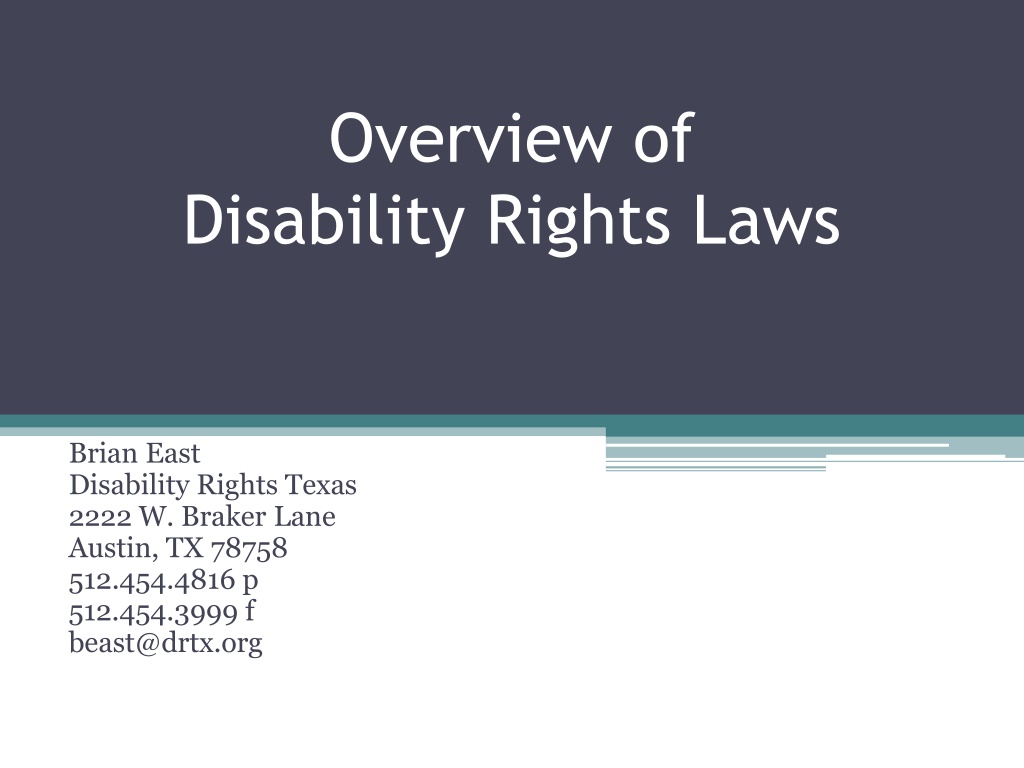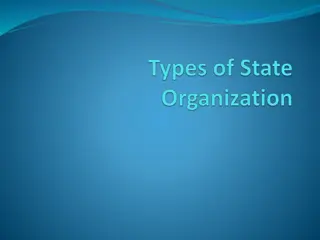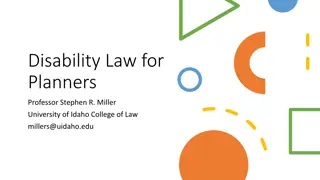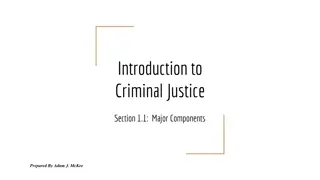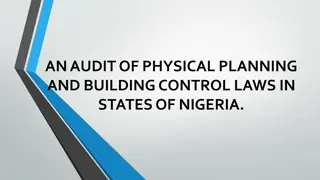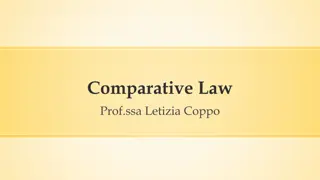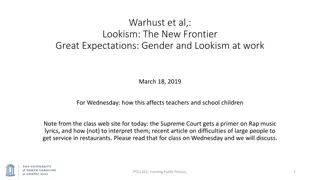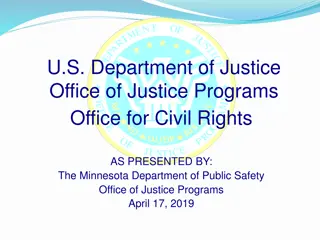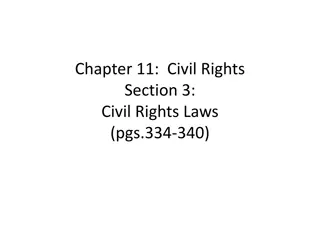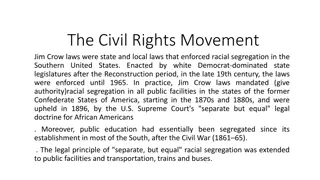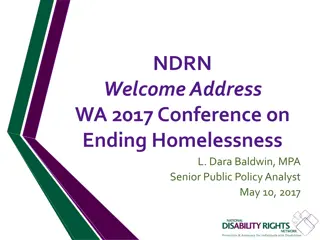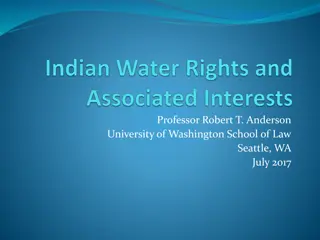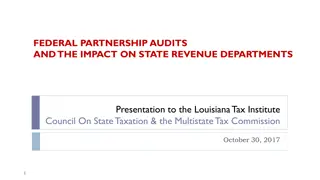Overview of Federal Disability Rights Laws in the United States
Federal disability rights laws play a crucial role in protecting individuals with disabilities from discrimination. The main laws include the Americans with Disabilities Act (ADA), Rehabilitation Act, and Fair Housing Act. These laws cover various aspects such as employment discrimination, accessibility in public spaces, and housing discrimination. The ADA Amendments Act of 2008 broadened the definition of disability, providing more protection for individuals. Understanding these laws is essential for ensuring equal rights and opportunities for people with disabilities.
Download Presentation

Please find below an Image/Link to download the presentation.
The content on the website is provided AS IS for your information and personal use only. It may not be sold, licensed, or shared on other websites without obtaining consent from the author. Download presentation by click this link. If you encounter any issues during the download, it is possible that the publisher has removed the file from their server.
E N D
Presentation Transcript
Overview of Disability Rights Laws Brian East Disability Rights Texas 2222 W. Braker Lane Austin, TX 78758 512.454.4816 p 512.454.3999 f beast@drtx.org
What Are the Main Federal Laws? ADA (as amended in 2008) Rehabilitation sections 501 504) Act of 1973 (esp. Fair Housing Act
What Does the ADA Cover? Title I of the ADA covers employment discrimination Title II covers discrimination by state & local governments ( public entities ) Title III covers discrimination by private businesses ( public accommodations ) Also covers discrimination in transportation and communications
What Does the Rehab Act Cover? 501 covers federal employment 503 covers employment by government contractors (no private suits; only administrative complaints with DOL) 504 covers disability discrimination of all kinds by recipients of federal financial assistance (i.e., federal aid or funding), e.g., most government agencies, colleges, hospitals, some non-profits, and doctors accepting Medicare/Medicaid
What Does the FHA Cover? Housing discrimination
Who Is Protected? Most claims require proof of disability The disability definition is the same for all 3 laws Actual disability: Physical or mental impairment That substantially limits A major life activity. Record of such an impairment Regarded as disability Some claims do not require proof of disability
ADA Amendments Act of 2008 Pre-ADAAA, the disability definition was interpreted very narrowly ADAAA made big changes in how the definition is interpreted; it is now much broader ADAAA applies to discrimination on or after January 1, 2009 Explicitly applies to ADA and Rehab Act claims Unclear if it applies to the FHA, or to state laws that track the ADA EEOC has issued ADAAA regs; DOJ to follow?
What does the ADAAA say? Remember 5 Key Points: 1) Broad construction of disability 2) Mitigating measures no longer considered 3) Conditions that are episodic or in remission are assessed in their active state 4) New major life activities of bodily functions 5) Regarded as only requires an impairment Note: ADAAA is not retroactive (i.e., does not apply to conduct occurring pre-2009)
Re the EEOCs ADAAA regs, who said that? New ADA Regulations Just Issued EEOC Rules Mean Virtually Everyone Is Disabled the ADAAA now renders everyone disabled Answer: Defense attorneys
What do the ADAAA regs actually say? My Top Ten List: 1. ADA must be broadly construed to achieve its remedial purpose. Cite: 29 C.F.R. Part 1630 App., 1630.1(c).
What do the ADAAA regs actually say? My Top Ten List: 2. There is no minimum duration; condition lasting less than six months can be substantially limiting. Cite: 29 C.F.R. 1630.2(j)(1)(ix); EEOC Q&A, Question 10.
What do the ADAAA regs actually say? My Top Ten List: 3. Condition, manner, or duration may be useful, but they are not required factors. Cite: 29 C.F.R. 1630.2(j)(4)(iv); 29 C.F.R. Part 1630 App., 1630.2(j)(4).
What do the ADAAA regs actually say? My Top Ten List: 4. One may be substantially limited in learning even with a history of academic success. Cite: 29 C.F.R. 1630.2(j)(4)(iii); 29 C.F.R. Part 1630 App., 1630.2(j).
What do the ADAAA regs actually say? My Top Ten List: 5. Central importance to daily life is NOT the standard for major life activities. Cite: 29 C.F.R. 1630.2(i)(2).
What do the ADAAA regs actually say? My Top Ten List: 6. Only one major life activity need be affected, so an individual is not excluded from coverage because of an ability to do many things. Cite: 29 C.F.R. 1630.2(j)(1)(viii); 29 C.F.R. 1630.2(j)(4)(iii).
What do the ADAAA regs actually say? My Top Ten List: 7. A person with a record of disability is entitled to seek accommodations. Cite: 29 C.F.R. 1630.2(k)(3).
What do the ADAAA regs actually say? My Top Ten List: 8. Except regarded as is normally the first choice because it is the broadest; the terms substantial limitation and major life activity irrelevant to it. in failure-to-accommodate claims, Cite: 29 C.F.R. 1630.2(g)(3); 29 C.F.R. 1630.2(j)(2); 29 C.F.R. Part 1630 App., 1630.2(1).
What do the ADAAA regs actually say? My Top Ten List: 9. Regarded as just means taking adverse action because of an actual or perceived impairment (whether or not there is a defense). Cite: 29 C.F.R. 1630.2(l)(2).
What do the ADAAA regs actually say? My Top Ten List: 10.In a regarded as claim, employer has the burden of proving impairment is both transitory and minor, measured objectively. Cite: 29 C.F.R. 1630.15(f).
What do the ADAAA regs actually say? My Top Ten List: 11. Actual disability still requires an individualized assessment of substantially limits, but some kinds of impairments will virtually always satisfy. Cite: 29 C.F.R. 1630.2(j)(3) (setting out list).
How are courts interpreting ADAAA? Actual quotes from recent cases is there a pattern? Simplex strongly disputes whether Terry has demonstrated that she suffers from a disability within the meaning of the ADA. Nonetheless, for purposes of its [summary judgment] motion, Simplex does not contest that Terry is a disabled person under the ADA.
Actual quotes from recent cases For purposes of this motion, Defendant assumes that Plaintiff's decreased hearing constitutes a disability under the ADA
Actual quotes from recent cases The City does not dispute that Plaintiff suffered an on-the-job injury that rendered him disabled as that term is defined under the ADA.
And these: Safeway will assume for purposes of this Motion that his speech impediment substantially limits a major life activity, and thus, is a disability under the ADA. Bausch & Lomb has assumed for the purposes of this motion that Parinello suffers from a disability (clinical depression) within the meaning of the statute. A prima facie showing also requires a plaintiff to be a qualifying individual with a disability, which defendant concedes plaintiff is.
Rare? There were also these: PMHCC makes no argument with respect to For purposes of summary judgment only, Parkwood admits Georgia Pacific does not dispute Defendants do not dispute JetBlue does not contest Defendants do not contest
And a few others: Plaintiff and Defendant agree Defendant challenges only Defendant appears to concede Defendants do not dispute The Board concedes Defendant MotorCity does not contest St. Joseph does not dispute It appears that Defendants do not contest ... defendant stipulates the District does not dispute Defendant does not dispute
But wait! Theres more! Kaluza alleges, and PNC does not dispute Morgan Stanley does not dispute ... defendants have not raised any arguments Lehigh admits that Defendants do not seriously dispute Ann Taylor has not challenged the parties do not dispute Defendants do not dispute HealthEast has conceded The Defendant does not dispute Verizon Wireless does not dispute the USPS Defendants do not directly dispute Illinois Bell concedes The City concedes NBME does not dispute Defendant concedes defendant does not contend are not in dispute Defendants do not contest it appears undisputed Defendants do not dispute Defendant Ford does not dispute The defendants do not contest Boeing does not dispute The defendants do not dispute it did not contest District does not dispute There does not appear to be a dispute the Fed assumes Swish Kenco concedes NYUCD does not contest the disability there appears to be no dispute no party disputes undisputed undisputed
Observations From Recent ADAAA Cases On the Issue of Disability Defendants frequently do not contest disability Summary judgment is commonly denied on the issue of disability When summary judgment is granted on disability, it is usually because of: lack of pleading lack of evidence lack of briefing
More Observations From Recent ADAAA Cases Regarded as is the area of broadest coverage and biggest change But regarded as is also the most misunderstood part of the ADAAA, both by lawyers and by the courts
Regarded As Need not look at substantially limited or major life activities; it does not matter how severe perception was Reasonable accommodation does not apply It is a defense if impairment is both transitory and minor Just need evidence of impairment (or perceived impairment ) plus causation
Regarded As Transitory 6 months or less Minor Common meaning E.g. not the cold or flu
Briefing errors: Failing to mention the ADAAA Mentioning the ADAAA but not explaining it Failing to marshal the facts and evidence Failing to apply the specifics of the ADAAA to the specific facts in the case
Drug or Alcohol Addiction Drug addiction: Current illegal drug use is not protected Current means recent. Shirley v. Precision Castparts Corp., 726 F.3d 675 (5th Cir. 2013) Past or rehabilitated addiction is likely protected (if not current ) Current alcoholism may be protected
So, What Are the New Battlegrounds in ADA Employment Cases? Qualified Pretext or causation Safety defenses
Definition of Qualified (Employment) Having the requisite skill, experience, education and other job-related requirements, and Able to perform the essential functions of the job (EJFs) with or without a reasonable accommodation
Determining the Essential Functions EEOC Resources 29 C.F.R. 1630.2(n) 29 C.F.R. pt 1630 App. 1630.2(n) EEOC Technical Assistance Manual 2.3, http://janweb.icdi.wvu.edu/links/ADAtam1.h tml EEOC Q&As and other guidance document Many cases begin analysis with review of EEOC regs (or guidance)
Essential Job Functions (contd) Statute requires that courts give consideration to employer s judgment. 42 U.S.C. 12111(8) Somehow, courts have turned that word into deference to the employer s judgment But deference is not absolute. See, e.g., Feldman v. Olin Corp., 692 F.3d 748 (7th Cir. 2012) ( We generally defer [b]ut this does not mean that we completely abdicate independent review. )
Reasonable Accommodation Definition in Employment Context Modifications or adjustments to application process Modifications or adjustments to environment, or to manner or circumstances a job is customarily performed, that enable individual to perform essential job functions Modifications or adjustments that enable person to enjoy equal benefits and privileges of employment. Feist v. Louisiana, 730 F.3d 450 (5th Cir. 2013) (close-in parking)
Reasonable Accommodation Request for accommodation normally required, but maybe not if, e.g.,: Need for accommodation is obvious Request for one would be futile Employer is removing prior accommodation Disability interferes with requesting one Barnett difference between reasonableness and undue hardship
Reasonable Accommodation Be creative; JAN has good information Participate in flexible interactive process in good faith Don t just say no
Reasonable Accommodation Medical leave common; indefinite leave disfavored Fixed-leave ( no fault leave) policies at risk 100% healed policies at risk General request to avoid stress disfavored Telework more and more likely Temporary accommodations vs. permanent ?
New Accommodation Cases McMillan v. City of New York, 711 F.3d 120 (2d Cir. 2013) (case manager with schizophrenia; condition and medication side-effects caused morning grogginess and tardiness ) court defers to employer judgment on essential functions, but that is far from the only factor; analysis is fact specific courts cannot rely on an assumption that attendance is an essential function of virtually all jobs; they must rely on evidence, not intuition
New Accommodation Cases McMillan v. City of New York, 711 F.3d 120 (2d Cir. 2013) (cont d) There was evidence of past flexibility, and of a somewhat flexible policy Sufficient evidence that plaintiff could work thru lunch and bank hours to offset late arrivals Court agreed that it would be undue hardship to force supervisor to work late in order to supervise plaintiff working make-up time, but there was evidence that it would not be required
New Accommodation Cases Keith v. County of Oakland, 703 F.3d 918 (6 th Cir. 2013) (fact issue whether deaf person was qualified to be lifeguard): Employer cannot simply rely on its doctor, especially when evaluation was cursory Ability to perform perfectly 100% of the time is an impossible standard Fact issue whether sign-language interpreters for occasional training sessions was reasonable Perhaps most compelling evidence was experience of other deaf lifeguards (experts)
New Accommodation Cases Mary Jo C. v. New York State and Local Retirement System, 707 F.3d 144 (2d Cir. 2013) Suggests that excusing untimely filing may be an accommodation or modification Court continues recent trend in holding that Title II does not apply to employment claims
New Accommodation Cases Wilson v. Dollar General Corp., 717 F.3d 337 (4th Cir. 2013) (plaintiff offered no evidence of other possible accommodation besides leave, and no evidence that would have worked) Basden v. Professional Transp., Inc., 714 F.3d 1034 (7th Cir. 2013) (insufficient evidence that plaintiff was able to come to work regularly, or that leave she sought would have helped) Olsen v. Capital Region Medical Center, 713 F.3d 1149 (8th Cir. 2013) (even with attempted accommodations, no evidence that tech could ensure patient safety because of seizures)
New Accommodation Cases Majors v. General Elec. Co., 714 F.3d 527 (7th Cir. 2013) (20-pound lifting restriction prevented essential part of job; having another do essential lifting was not reasonable) Cloe v. City of Indianapolis, 712 F.3d 1171 (7th Cir. 2013) (employee did not ask for help with written work, so city not liable for failing to offer proofreading; but sufficient evidence of retaliation for requesting accommodation) Smith v. Clark County School Dist., 727 F.3d 950 (9th Cir. 2013) (application for disability retirement not inconsistent with qualified )
Pretext or Causation ADA and 501 do not require proof of sole cause; 504 arguably does After Gross, does ADA require but for cause? Pretext analysis often applied if employer denies its action based on disability or effects Pretext analysis does not apply to accommodation claims. McMillan v. City of New York, 711 F.3d 120 (2d Cir. 2013) Disability-related misconduct has some special rules
Pretext or CausationNew Cases Brown v. City of Jacksonville, 711 F.3d 883 (8th Cir. 2013) (comments were too far back) Lenzen v. Workers Compensation Reinsurance Ass n, 705 F.3d 816 (8th Cir. 2013) (no evidence that performance problems were pretext; history of successful accommodations) Kelley v. Correctional Medical Services, Inc., 707 F.3d 108 (1st Cir. 2013) (history of negative reactions to accommodation requests)
Medical inquiries Generally, it is illegal to ask job applicant about the existence, nature, or severity of a disability Once conditional offer is made, can ask anything as long as done uniformly Can ask current employees if job-related and consistent with business necessity. See Owusu-Ansah v. Coca-Cola Co., 715 F.3d 1306 (11th Cir. 2013) (fitness-for- duty justified by threats from employee)
